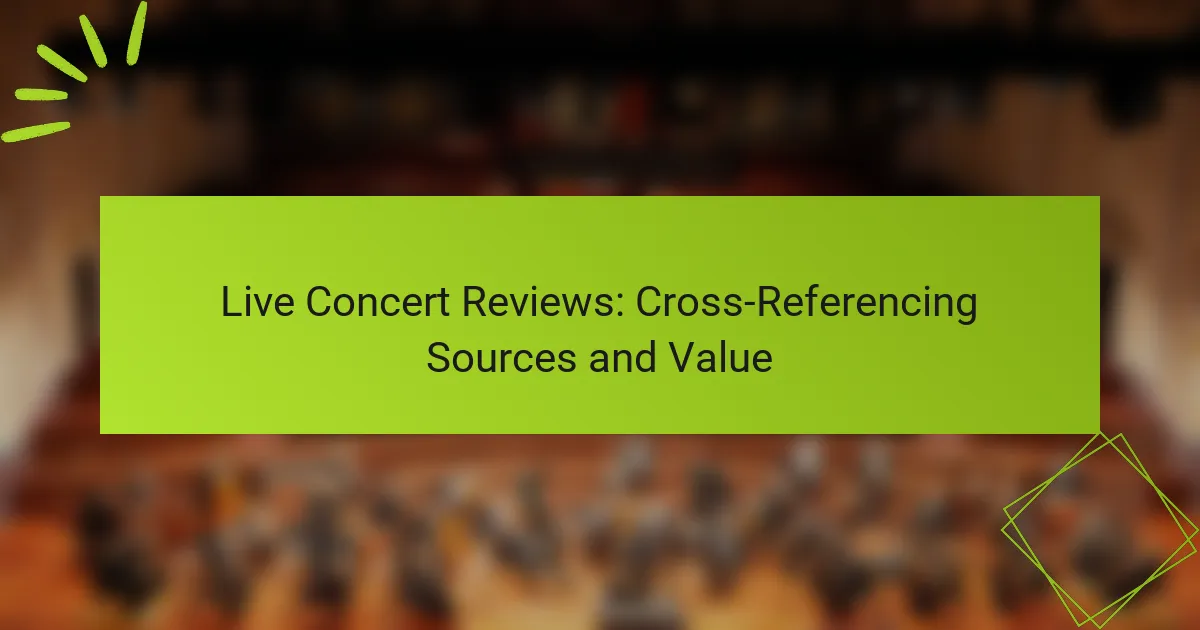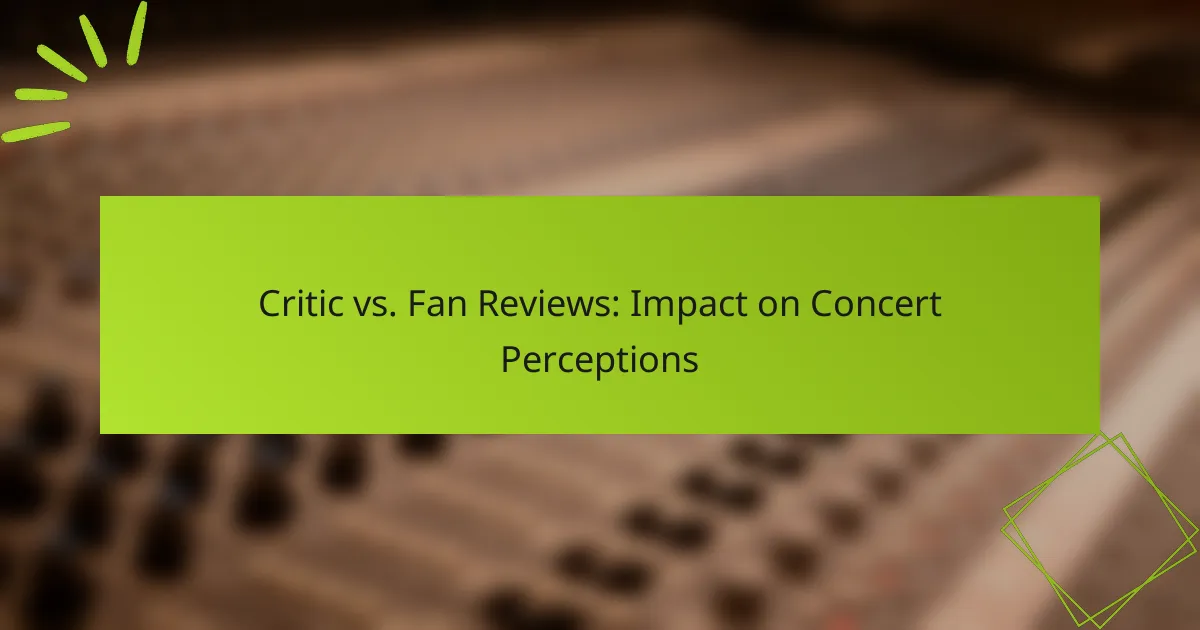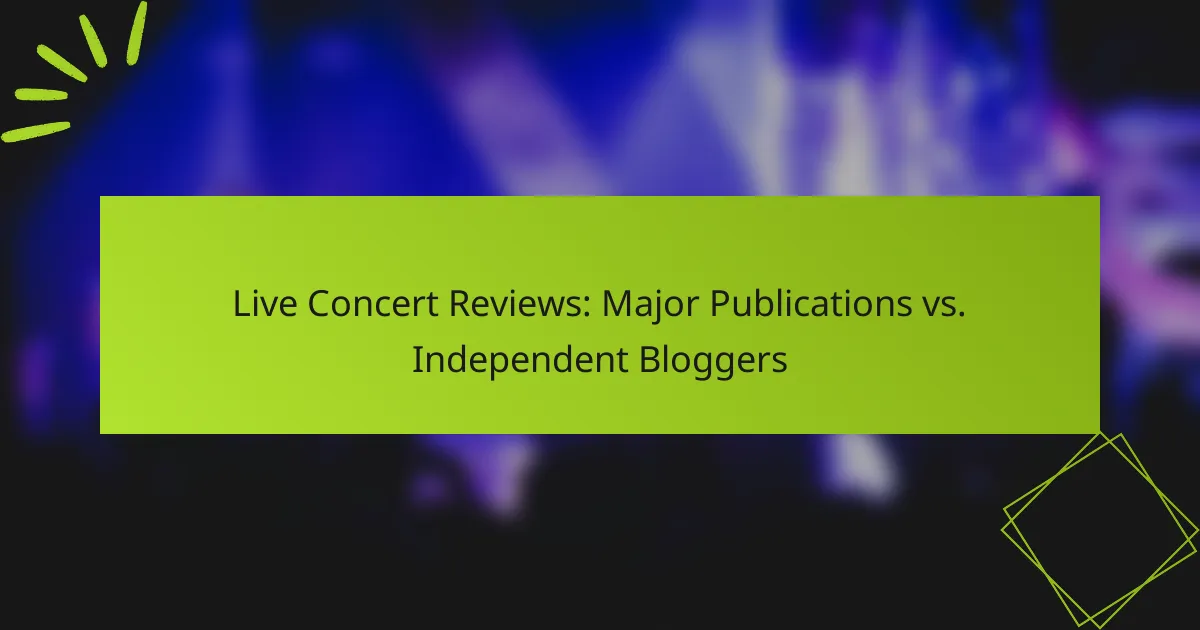Live concert reviews serve as valuable resources for fans seeking to understand the nuances of performances. By cross-referencing multiple sources, attendees can uncover consistent themes and gain deeper insights into the concert experience. Evaluating the credibility of these reviews, along with expert opinions and audience feedback, enhances the reliability of the information available.
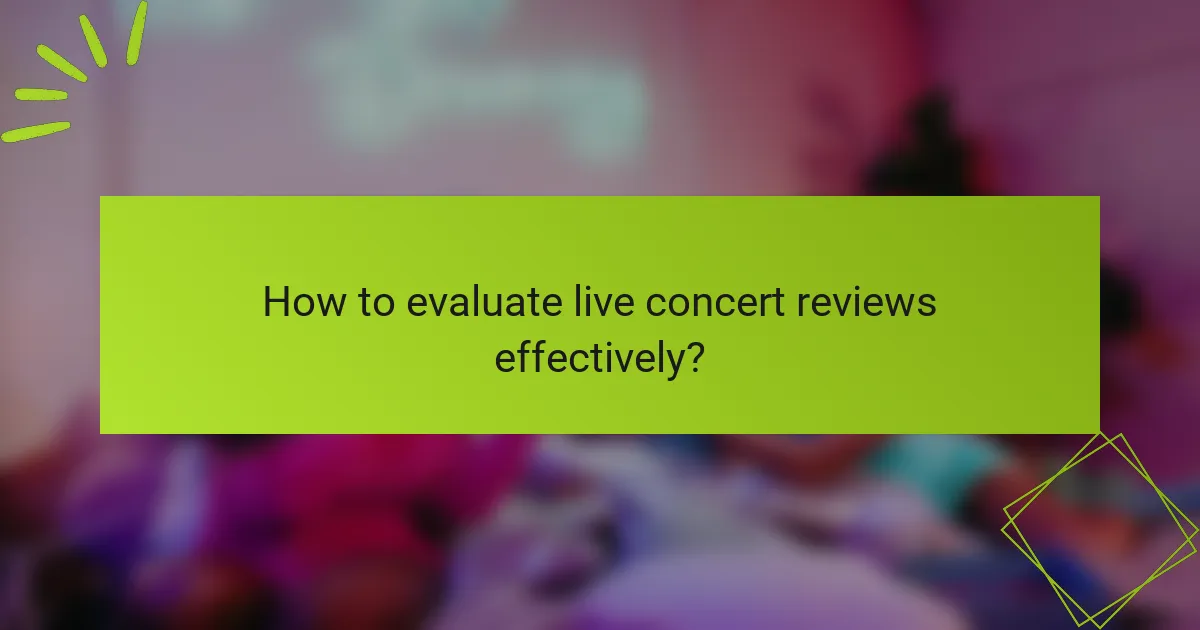
How to evaluate live concert reviews effectively?
To evaluate live concert reviews effectively, focus on the credibility of the sources, the insights from experts, and the feedback from audiences. A thorough assessment involves cross-referencing multiple reviews and identifying consistent themes that emerge across different perspectives.
Identify credible sources
Start by determining the reliability of the sources providing the concert reviews. Look for established music publications, reputable blogs, or well-known critics who have a history of insightful commentary on live performances. Avoid reviews from unknown or biased sources that may lack objectivity.
Check the author’s background and previous work to gauge their expertise in music criticism. A credible source typically has a strong portfolio and is recognized within the music community.
Check for expert opinions
Expert opinions can significantly enhance the value of concert reviews. Look for insights from music critics, industry professionals, or musicians who attended the concert. Their perspectives often provide a deeper understanding of the performance quality, technical execution, and overall impact.
Consider the context in which the expert is commenting, as their familiarity with the artist or genre may influence their evaluation. Reviews that include expert commentary tend to offer a more nuanced view of the concert experience.
Analyze audience feedback
Audience feedback is a crucial component of evaluating live concert reviews. Look for comments and ratings from concertgoers on social media platforms, music forums, or ticketing websites. This grassroots perspective can reveal how the performance resonated with fans and highlight aspects that critics may overlook.
Pay attention to common sentiments expressed by the audience, such as excitement about specific songs or critiques of the venue. This feedback can provide a well-rounded view of the concert’s reception.
Cross-reference multiple reviews
Cross-referencing multiple reviews helps to create a balanced perspective on the concert. Read reviews from various sources to identify common points and differing opinions. This approach can help mitigate bias and provide a more comprehensive understanding of the event.
When cross-referencing, take note of the overall consensus regarding key elements like performance quality, setlist, and audience engagement. This can guide you in forming your own opinion about the concert.
Look for consistent themes
Identifying consistent themes across different reviews can highlight the most significant aspects of the concert. Look for recurring comments about the artist’s performance, stage presence, and audience interaction. These themes often indicate what stood out during the event.
Additionally, consistent themes can help you discern whether certain criticisms or praises are widely shared or isolated opinions. This can be particularly useful when deciding whether to attend future performances by the same artist.
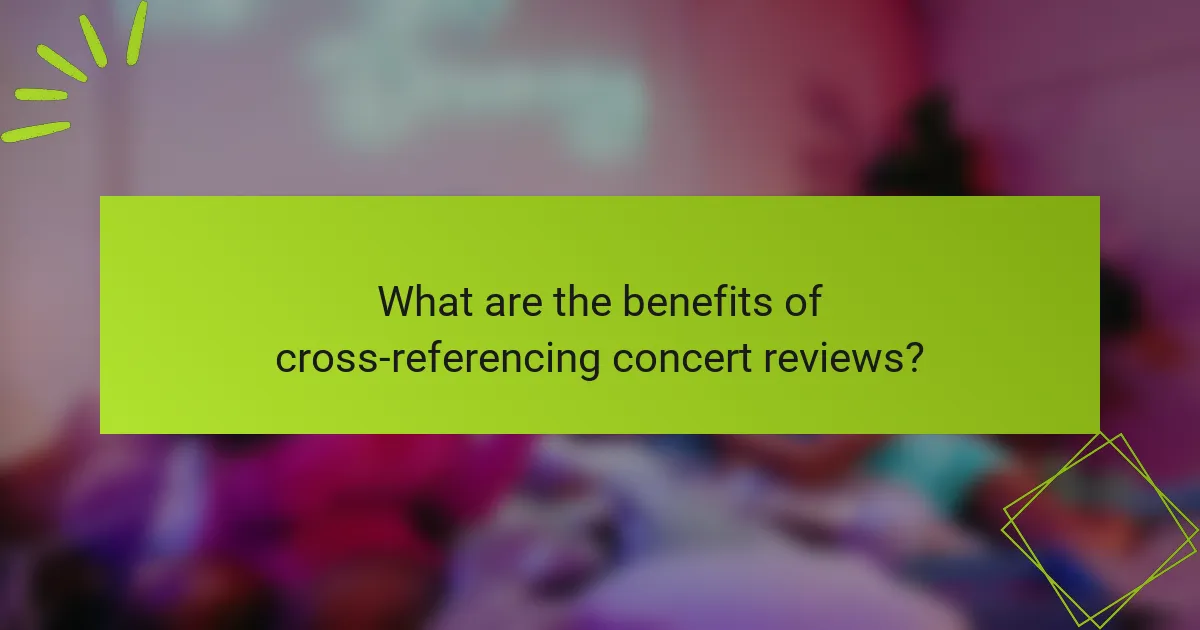
What are the benefits of cross-referencing concert reviews?
Cross-referencing concert reviews enhances the reliability and depth of information available to fans. By comparing multiple sources, attendees can gain a more comprehensive understanding of performances and the overall concert experience.
Enhanced accuracy of information
Cross-referencing concert reviews helps to verify facts and details about a performance. When multiple reviewers report similar observations, it increases the likelihood that the information is accurate. For instance, if several sources note a particular song’s standout performance, it is more likely to be true.
Additionally, discrepancies in reviews can highlight different interpretations of the same event. By analyzing these variations, readers can discern which aspects of a concert were universally praised or criticized, leading to a more nuanced understanding of the performance.
Diverse perspectives on performances
Each reviewer brings their unique background and preferences to their concert evaluations. Cross-referencing allows fans to access a variety of viewpoints, which can enrich their understanding of the performance. For example, a critic with a classical music background may focus on technical aspects, while a pop culture blogger might emphasize the overall entertainment value.
This diversity in perspectives can help attendees appreciate different elements of a concert, such as stage presence, audience engagement, and musical execution. It also encourages fans to consider their own tastes when evaluating performances.
Improved decision-making for attendees
When planning to attend a concert, cross-referencing reviews can significantly inform decision-making. Fans can compare reviews to identify which shows are worth their time and money. For instance, if multiple sources highlight a particular artist’s electrifying performance, it may be a strong indicator to attend that concert.
Moreover, understanding common themes in reviews—such as sound quality or venue atmosphere—can help attendees choose concerts that align with their preferences. This approach minimizes the risk of disappointment and enhances the overall concert experience.
Identification of reliable reviewers
Cross-referencing reviews can help fans identify which reviewers consistently provide trustworthy insights. By observing patterns in reviews, readers can discern which critics have a reputation for thoroughness and accuracy. For example, a reviewer who frequently attends concerts in a specific genre may offer more credible insights than a generalist.
Additionally, fans can follow reliable reviewers to stay updated on upcoming concerts and trends. Engaging with trusted sources can lead to a more informed and enjoyable concert-going experience.
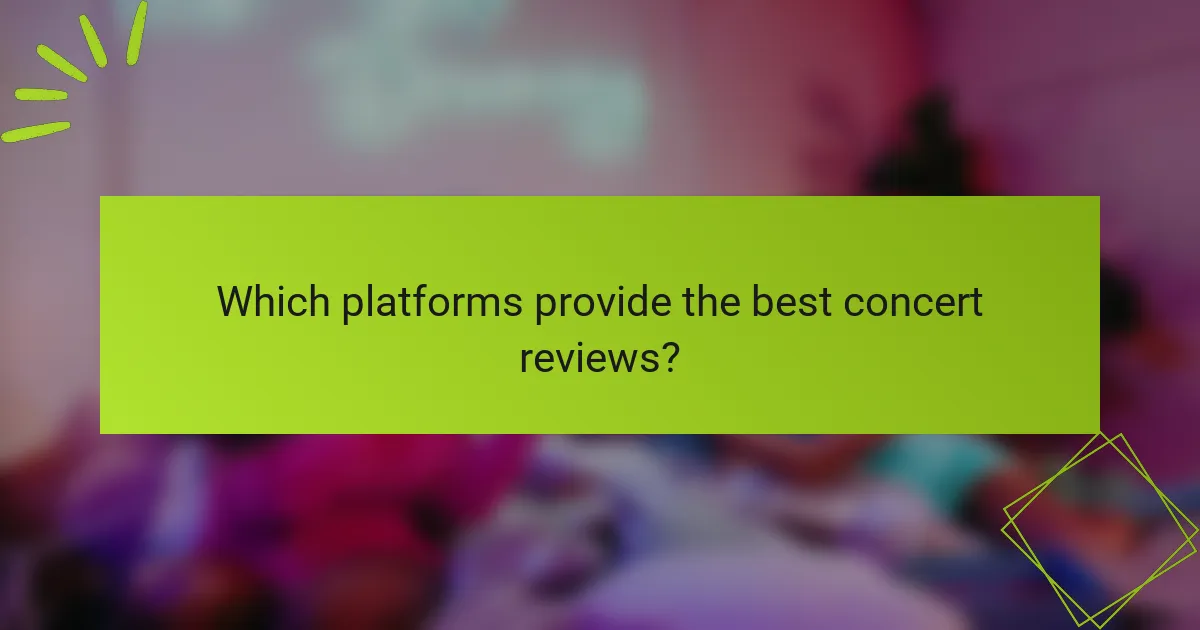
Which platforms provide the best concert reviews?
Several platforms excel in providing concert reviews, each catering to different musical genres and audience preferences. For comprehensive coverage, consider the strengths of Pitchfork, Rolling Stone, Setlist.fm, and Songkick.
Pitchfork for indie music
Pitchfork is renowned for its in-depth reviews and critiques of indie music concerts. The platform often features detailed analyses that highlight the artistic elements of performances, making it a go-to source for fans of the genre.
When using Pitchfork, look for reviews that not only describe the concert experience but also provide context about the artist’s work and the setlist. This can enhance your understanding of the performance’s significance within the indie music scene.
Rolling Stone for mainstream coverage
Rolling Stone offers extensive coverage of mainstream concerts, focusing on popular artists and major events. Their reviews typically include insights into the performance, production quality, and audience engagement, appealing to a broad audience.
For those interested in mainstream music, Rolling Stone’s reviews often feature star ratings and highlight standout moments. This can help you gauge whether a concert is worth attending based on critical reception.
Setlist.fm for setlist details
Setlist.fm specializes in providing detailed setlists from concerts, making it an invaluable resource for fans wanting to know what songs were performed. Users can search for specific concerts and view the exact order of songs played, along with any notable variations.
Utilizing Setlist.fm can enhance your concert experience by allowing you to anticipate which songs might be performed based on previous setlists. This is particularly useful for fans tracking their favorite artists’ tours.
Songkick for concert alerts
Songkick is primarily a concert alert service that notifies users about upcoming shows based on their favorite artists. By signing up, you can receive personalized alerts when artists you follow announce concerts in your area.
To maximize Songkick’s effectiveness, ensure your profile is updated with your favorite artists and location. This way, you won’t miss out on any local concerts, and you can plan ahead to secure tickets for popular events.
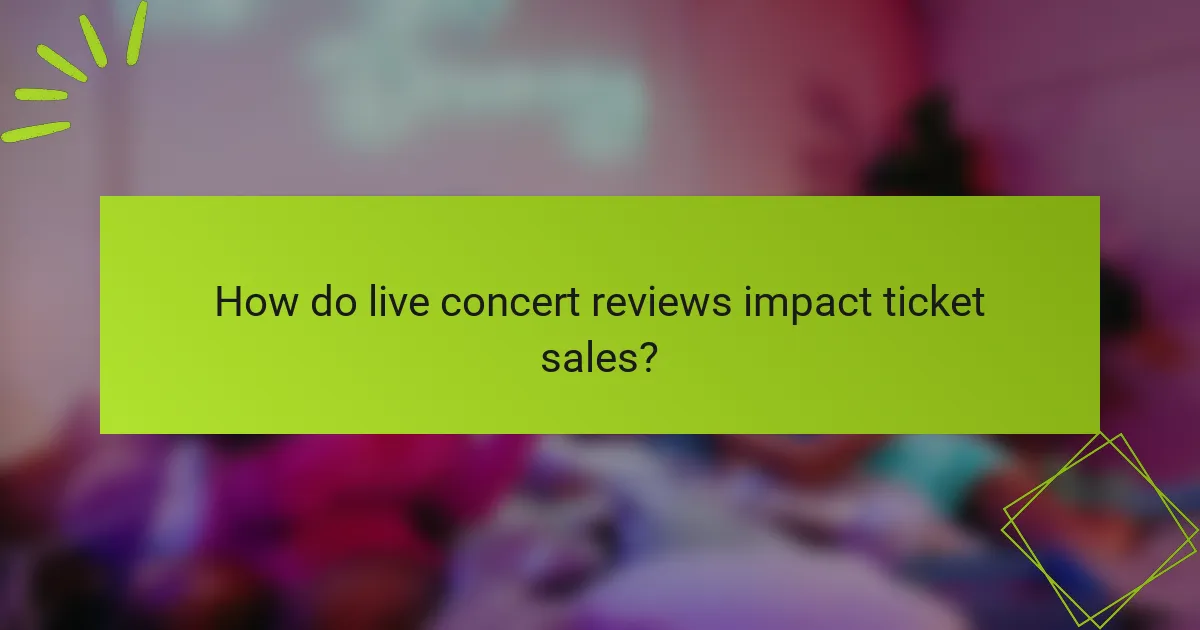
How do live concert reviews impact ticket sales?
Live concert reviews significantly influence ticket sales by shaping public perception and interest in an event. Positive feedback can lead to increased demand, while negative critiques may discourage potential attendees.
Positive reviews boost sales
Positive concert reviews create a favorable impression that can enhance ticket sales. When critics highlight an artist’s performance quality, stage presence, or overall experience, potential buyers are more likely to purchase tickets. For instance, a review praising a unique stage setup or an engaging setlist can attract a wider audience.
Moreover, strong reviews can lead to word-of-mouth promotion, further amplifying interest. Fans often share their excitement on social media, which can lead to a surge in ticket sales, especially if the concert is in high demand.
Negative reviews deter potential buyers
Negative reviews can have a detrimental effect on ticket sales by instilling doubt in potential attendees. If critics point out issues such as poor sound quality or lackluster performances, it may lead to decreased interest. For example, a review that mentions a disorganized event or an artist’s lack of engagement can dissuade fans from attending.
Additionally, negative feedback can spread quickly through social media channels, amplifying its impact. This can result in a significant drop in ticket sales, especially if the concert is not yet sold out.
Influence of social media on sales
Social media plays a crucial role in amplifying the effects of concert reviews on ticket sales. Platforms like Twitter, Instagram, and Facebook allow fans to share their opinions and experiences instantly, reaching a broad audience. A single positive review shared widely can lead to a rapid increase in ticket purchases.
Conversely, negative sentiments can spread just as quickly, potentially harming sales. Artists and promoters should actively monitor social media feedback and engage with fans to mitigate any adverse effects and encourage positive discussions around their concerts.
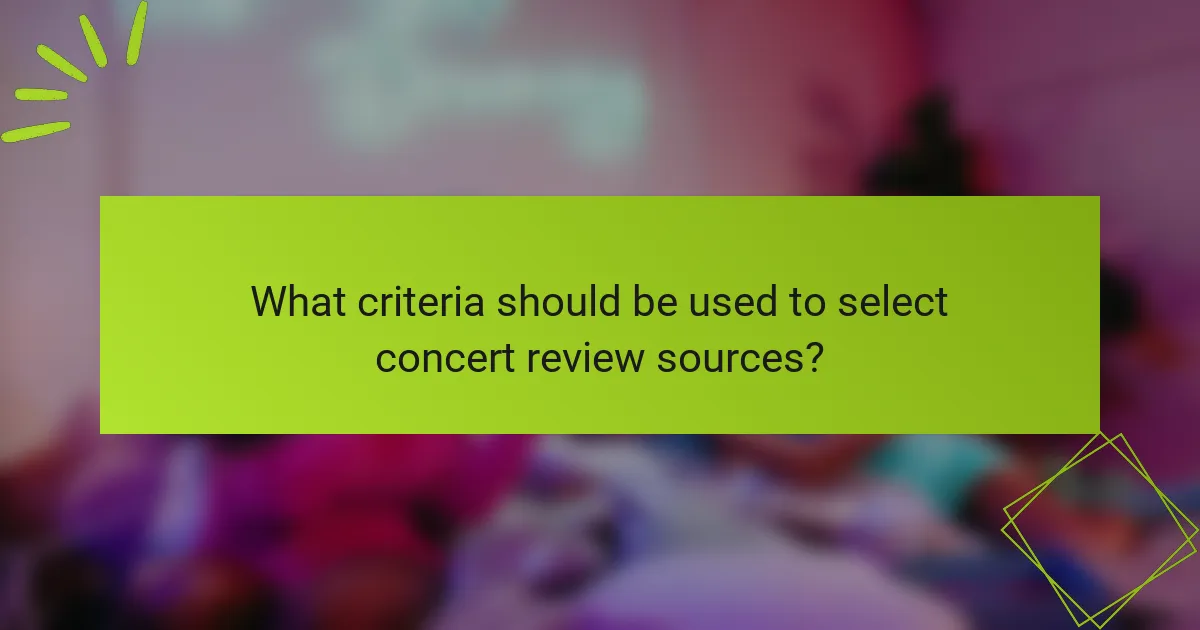
What criteria should be used to select concert review sources?
Selecting concert review sources requires evaluating their credibility, expertise, and the depth of their analysis. Reliable sources will provide insightful commentary that enhances your understanding of the performance and the artist’s context.
Reputation of the reviewer
The reputation of the reviewer is crucial in determining the quality of the concert review. Look for critics with a history of insightful commentary and a strong following in the music community. Established reviewers from respected publications or platforms often have a proven track record of fair and knowledgeable assessments.
Consider checking the reviewer’s previous work and their engagement with the music scene. A reviewer who frequently covers a specific genre or artist may provide more nuanced insights than a generalist. Social media presence and audience feedback can also indicate their credibility.
Depth of analysis provided
Depth of analysis is essential for understanding the nuances of a concert. A good review should go beyond surface-level observations, offering insights into the performance’s emotional impact, technical execution, and the artist’s interpretation of their work. Look for reviews that discuss specific songs, arrangements, and the overall atmosphere of the event.
When evaluating depth, consider whether the review includes comparisons to previous performances or other artists. Reviews that contextualize the concert within the artist’s career or the broader music landscape can provide valuable perspectives. Aim for sources that balance personal impressions with informed critique.
